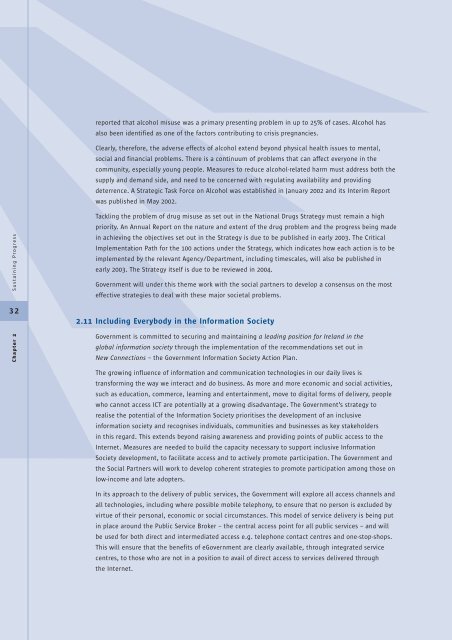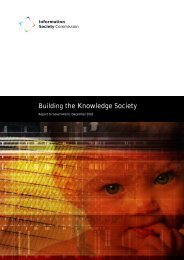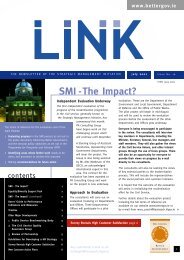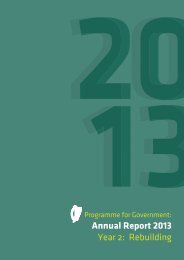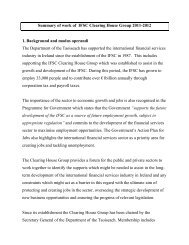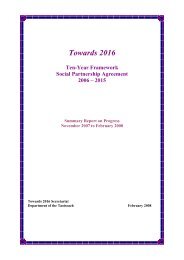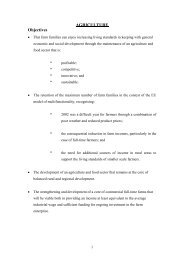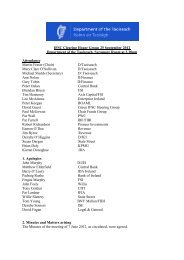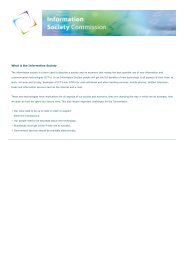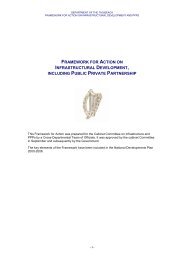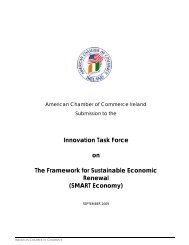Sustaining Progress - Department of Taoiseach
Sustaining Progress - Department of Taoiseach
Sustaining Progress - Department of Taoiseach
Create successful ePaper yourself
Turn your PDF publications into a flip-book with our unique Google optimized e-Paper software.
Chapter 2 <strong>Sustaining</strong> <strong>Progress</strong><br />
32<br />
reported that alcohol misuse was a primary presenting problem in up to 25% <strong>of</strong> cases. Alcohol has<br />
also been identified as one <strong>of</strong> the factors contributing to crisis pregnancies.<br />
Clearly, therefore, the adverse effects <strong>of</strong> alcohol extend beyond physical health issues to mental,<br />
social and financial problems. There is a continuum <strong>of</strong> problems that can affect everyone in the<br />
community, especially young people. Measures to reduce alcohol-related harm must address both the<br />
supply and demand side, and need to be concerned with regulating availability and providing<br />
deterrence. A Strategic Task Force on Alcohol was established in January 2002 and its Interim Report<br />
was published in May 2002.<br />
Tackling the problem <strong>of</strong> drug misuse as set out in the National Drugs Strategy must remain a high<br />
priority. An Annual Report on the nature and extent <strong>of</strong> the drug problem and the progress being made<br />
in achieving the objectives set out in the Strategy is due to be published in early 2003. The Critical<br />
Implementation Path for the 100 actions under the Strategy, which indicates how each action is to be<br />
implemented by the relevant Agency/<strong>Department</strong>, including timescales, will also be published in<br />
early 2003. The Strategy itself is due to be reviewed in 2004.<br />
Government will under this theme work with the social partners to develop a consensus on the most<br />
effective strategies to deal with these major societal problems.<br />
2.11 Including Everybody in the Information Society<br />
Government is committed to securing and maintaining a leading position for Ireland in the<br />
global information society through the implementation <strong>of</strong> the recommendations set out in<br />
New Connections – the Government Information Society Action Plan.<br />
The growing influence <strong>of</strong> information and communication technologies in our daily lives is<br />
transforming the way we interact and do business. As more and more economic and social activities,<br />
such as education, commerce, learning and entertainment, move to digital forms <strong>of</strong> delivery, people<br />
who cannot access ICT are potentially at a growing disadvantage. The Government’s strategy to<br />
realise the potential <strong>of</strong> the Information Society prioritises the development <strong>of</strong> an inclusive<br />
information society and recognises individuals, communities and businesses as key stakeholders<br />
in this regard. This extends beyond raising awareness and providing points <strong>of</strong> public access to the<br />
Internet. Measures are needed to build the capacity necessary to support inclusive Information<br />
Society development, to facilitate access and to actively promote participation. The Government and<br />
the Social Partners will work to develop coherent strategies to promote participation among those on<br />
low-income and late adopters.<br />
In its approach to the delivery <strong>of</strong> public services, the Government will explore all access channels and<br />
all technologies, including where possible mobile telephony, to ensure that no person is excluded by<br />
virtue <strong>of</strong> their personal, economic or social circumstances. This model <strong>of</strong> service delivery is being put<br />
in place around the Public Service Broker – the central access point for all public services – and will<br />
be used for both direct and intermediated access e.g. telephone contact centres and one-stop-shops.<br />
This will ensure that the benefits <strong>of</strong> eGovernment are clearly available, through integrated service<br />
centres, to those who are not in a position to avail <strong>of</strong> direct access to services delivered through<br />
the Internet.


